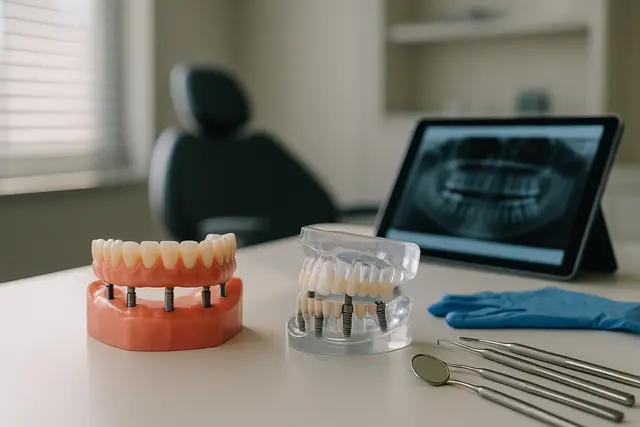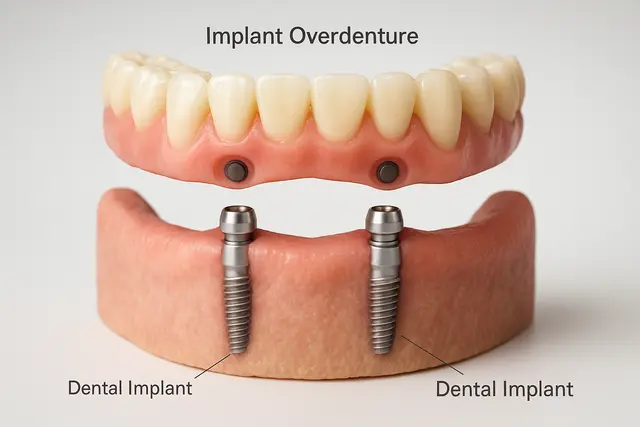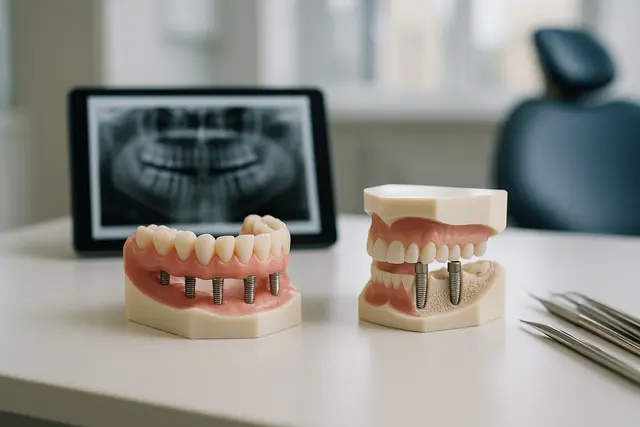Prosthodontics
4 min read
Sep 18, 2025
Are Dental Implants a Good Idea for Seniors?
Losing teeth is never easy, and for many seniors, dentures or gaps in the smile can make daily life uncomfortable. With modern advances in dentistry, dental implants have become a popular solution that promises better comfort, confidence, and long-term oral health. But are they really the right choice for older adults?

If you're a senior reading this and wondering if a dental implant might be a better solution than your trusty old denture (or that embarrassing gap in your smile), you're not alone. Many seniors are asking the same question. Dental implants are an increasingly popular tooth replacement option, but are they really the right fit for the golden years?
Dental Implant Basics Everyone Should Know
First off, what exactly is a dental implant? Think of it as a high-tech stand-in for a natural tooth. Implants are artificial tooth roots shaped like tiny screws, usually made of titanium. They’re placed into your jawbone, and once healed, they attach new teeth (aka dental crowns) that look and function like your natural teeth. No slipping, no clicking, no hunting for your “false teeth” at bedtime.
Dental implants replace everything from one missing tooth to a full set. For seniors who have dealt with tooth loss or who’ve had enough of full dentures, implants can offer a major upgrade in comfort and confidence.
Why Dental Implants Are a Great Option for Seniors
Let’s get one thing straight: age alone doesn’t disqualify you from implant treatment. In fact, dental implants are often a great option for seniors because they help restore chewing ability, support facial structure, and prevent bone loss in the jawbone.
As long as you’re in good general health and have enough bone density (or are a candidate for a bone graft), there’s a strong chance you’ll benefit from dental implants. Elderly individuals with stable health, good oral hygiene, and realistic expectations are often ideal candidates.
And here's the real kicker: implants can last a lifetime if you cares for your dental implants properly. That means brushing, flossing, and seeing your dentist regularly. No, you can’t just forget they’re there, but the payoff is big.
Dental Implants for Seniors With Missing Teeth or Dentures
Many seniors get dental implants to replace missing teeth or as an alternative to dentures. Let’s be honest, dentures can be annoying. They slip, click, and can make eating corn on the cob feel like an Olympic event. Dental implants, on the other hand, are solid. They stay in place, feel like your natural teeth, and don’t require sticky adhesive or awkward adjustments.
Full dentures sit on top of your gums, but implants are anchored in your jawbone, which helps maintain bone health. That means your face is less likely to get that sunken-in look over time. For seniors considering a more permanent fix, implants provide a better fit in your mouth and a better quality of life for seniors overall.
What Seniors Need to Consider
So, should you get dental implants? Good question. Here are a few things elderly patients (and their loved ones) need to consider:
Overall health: You don’t have to be a marathon runner, but good overall health and stable chronic conditions (like diabetes or heart disease) help ensure the success of dental implants.
Bone density: If you’ve had tooth loss for a while, you might have reduced bone density in your jawbone. But don’t panic. A bone graft is sometimes used to build up the area before implant placement.
Dental hygiene habits: Implants don’t get cavities, but the gums around the implant still need care. If you’re committed to good oral hygiene, you’re already ahead of the game.
Budget: Let’s not dance around it, the cost of dental implants can be high upfront. But implants are a long-term investment. Unlike bridges or dentures that may need regular adjustments or replacements, implants often outlast other options.
Understanding the Dental Implant Procedure
Now, onto the nitty-gritty: the dental implant procedure itself. It usually involves several steps over a few months, depending on healing time and whether a bone graft is needed.
Consultation: Your dentist or oral surgeon will evaluate your bone, teeth, and overall health.
Implant surgery: The implant is placed into your jawbone under local anesthesia. Sounds scary? It’s really not, it’s often less painful than a tooth extraction.
Healing and osseointegration: The jawbone grows around the implant (this part can take a few months).
Crown placement: Once the implant is secure, a custom dental crown is attached to match your teeth and fit in your mouth like it’s always been there.
And that’s it. You’re now the proud owner of a dental implant that looks and feels like real teeth.
Exploring the Benefits of Dental Implants for the Elderly
The benefits of dental implants go way beyond aesthetics. Yes, it’s great to smile with confidence, but here’s what else implants can do:
Restore chewing power: Go ahead, order the steak.
Prevent jawbone loss: Unlike dentures, implants stimulate the jawbone and help maintain bone structure.
Boost confidence: Implants feel like natural teeth. No more worrying about slippage or mumbling through your dinner date.
Improve nutrition: Better chewing means better digestion and better overall health.
In short, dental implants can improve quality of life, especially for elderly patients who’ve struggled with dental issues for years.
Tips for Seniors Considering Dental Implants
If you’re seniors considering dental implants, here are a few takeaways:
Talk to your dentist about your implant treatment options tailored to seniors, especially if you have existing medical conditions.
Don’t assume you’re too old. The success rate of dental implants in older adults is very high.
Ask about implant treatment options tailored to seniors. You might not need a full set, you may just need one or two implants to stabilize your denture or support a few artificial teeth.
Compare long-term value. Implants may be pricier upfront, but they’re durable, effective, and implants don’t wear out easily.
Think about your comfort. If your current false teeth are frustrating, dental implants could make daily life easier and more enjoyable
Are Seniors Good Candidates for Dental Implants?
Yes, many seniors are excellent candidates for dental implants. Age alone is not a barrier; what matters most is overall health and bone density. Seniors in stable health with good oral hygiene habits often benefit greatly from implants. Even if bone loss has occurred, bone grafting can often make the procedure possible. With proper care, implants can last a lifetime, making them a reliable solution for older adults seeking long-term dental stability.
How Do Dental Implants Compare to Dentures for Seniors?
Dental implants offer significant advantages over dentures. Unlike dentures, which rest on the gums and can slip or cause discomfort, implants are securely anchored in the jawbone. This not only prevents embarrassing movement but also helps maintain bone health, reducing the sunken appearance dentures may cause. For seniors frustrated with adhesives, slipping, or limited food choices, implants provide a stable, natural-feeling solution that restores chewing ability and confidence.
What Is the Dental Implant Procedure Like for Older Adults?
The dental implant process is typically straightforward, though it happens over several months. It starts with a consultation and evaluation of health and bone structure. During surgery, implants are placed into the jawbone under local anesthesia, often with less discomfort than a tooth extraction. Healing then allows the bone to integrate with the implant, after which a custom crown is attached. For seniors, this step-by-step approach ensures a stable, natural-looking tooth replacement.
What Are the Long-Term Benefits of Dental Implants for Seniors?
Dental implants provide both functional and health benefits. They restore full chewing power, allowing seniors to enjoy a wider variety of foods and improve nutrition. They also prevent bone loss by stimulating the jawbone, which dentures cannot do. Beyond health, implants boost confidence by offering a natural look and feel without fear of slipping. For seniors, implants are a durable, long-lasting investment that significantly improves quality of life.
Read Next
Related Posts

Prosthodontics
Implant Supported Dentures Overview
Missing teeth can impact more than just your smile, they can affect your confidence, comfort, and even your diet. Fortunately, modern dentistry offers a solution that’s both secure and natural-looking: implant-supported dentures. This innovative approach blends the stability of implants with the convenience of dentures to create a long-lasting, life-improving upgrade.
5 min read
Oct 29, 2025

Prosthodontics
Implant Overdentures Explained: The Hybrid Solution to Missing Teeth
Missing teeth can impact everything from your ability to eat to your self-confidence. While traditional dentures have long been a go-to solution, they often fall short in comfort and stability. Implant overdentures offer a modern alternative that combines the security of dental implants with the convenience of removable dentures, a true upgrade for those looking to reclaim their smile.
6 min read
Oct 29, 2025

Prosthodontics
Implant Retained Dentures Explained
Considering implant-retained dentures? You're not alone. As modern dentistry evolves, more people are turning to this secure, natural-feeling alternative to traditional dentures. This guide will walk you through what they are, how they work, and why they might be the solution you've been looking for.
4 min read
Oct 28, 2025
Don’t have time to research every dentist around you?
See why 30k+ patients trusted us